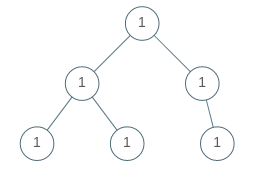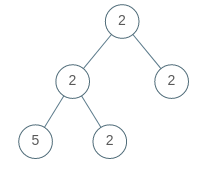A binary tree is univalued if every node in the tree has the same value.
Return true if and only if the given tree is univalued.
Example 1:

Input: [1,1,1,1,1,null,1]
Output: true
Example 2:

Input: [2,2,2,5,2]
Output: false
Note:
- The number of nodes in the given tree will be in the range
[1, 100]. - Each node's value will be an integer in the range
[0, 99].
recursion
time: O(n), space: O(height)
扫描二维码关注公众号,回复:
4719054 查看本文章


/** * Definition for a binary tree node. * public class TreeNode { * int val; * TreeNode left; * TreeNode right; * TreeNode(int x) { val = x; } * } */ class Solution { public boolean isUnivalTree(TreeNode root) { if(root == null) { return true; } if(root.left == null && root.right == null) { return true; } if(root.left != null && root.val != root.left.val) { return false; } if(root.right != null && root.val != root.right.val) { return false; } return isUnivalTree(root.left) && isUnivalTree(root.right); } }